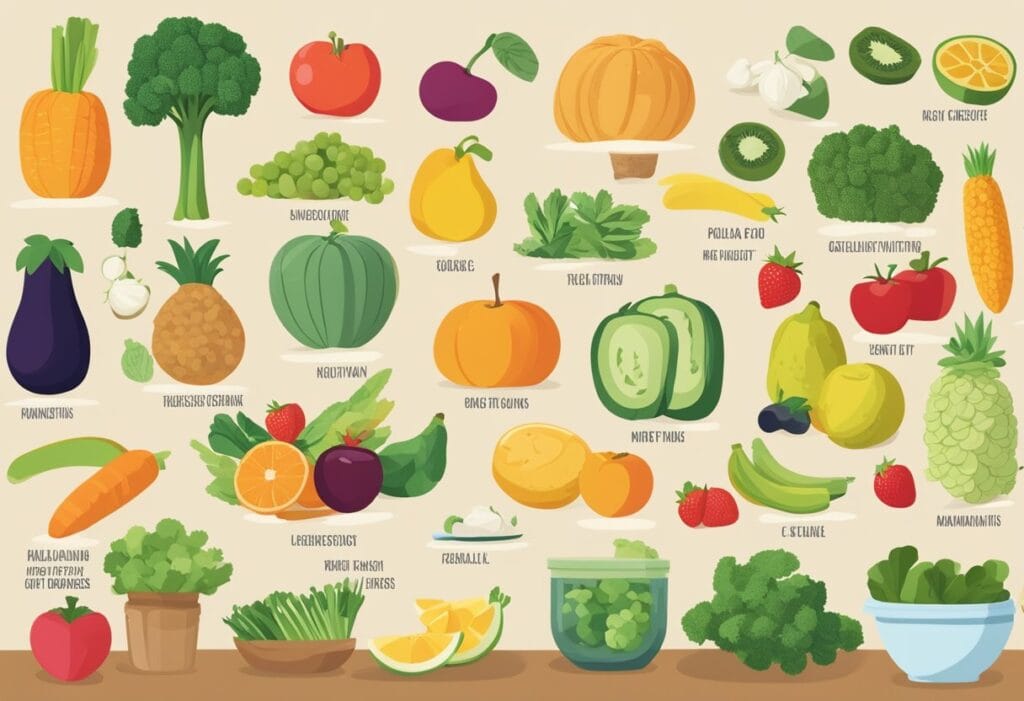Embarking on a journey toward digestive harmony, our “10 Tips for Maintaining a Healthy Gut: Your Guide to Digestive Wellness” unveils a treasure trove of strategies designed to nurture your gastrointestinal realm. In the bustling ecosystem of your gut, a delicate balance reigns supreme, where trillions of microbes hold the keys to our overall health. This intricate dance within, often unnoticed, can sway the rhythm of our daily lives, influencing everything from mood to immunity.
As we navigate the complexities of modern diets and lifestyles, the quest for gut health becomes paramount. In this comprehensive guide, we’ll explore the symbiotic relationship between what we consume and how we feel, offering insights that transcend the ordinary advice. Each tip, steeped in the latest research and holistic wisdom, is a stepping stone toward digestive wellness, paving the way for a revitalized you.
From the fibrous foundations of a gut-friendly diet to the stress-soothing practices that quell internal storms, our guide is more than a mere list—it’s a manifesto for those who seek to reclaim their health from the ground up. So, join us as we delve into the art and science of gut maintenance, where every morsel of knowledge has the potential to transform your wellbeing. Your journey to a vibrant, thriving digestive system begins with a single, mindful step—let this be the one that leads you to lasting health and vitality.
Overview
Maintaining a healthy gut is essential for overall wellness. The gut, also known as the digestive tract, is responsible for breaking down food and absorbing nutrients. In addition, the gut is home to trillions of bacteria that make up the gut microbiome. These bacteria play a crucial role in maintaining a healthy immune system and aiding in digestion.

Research has shown that an unhealthy gut can lead to a variety of health problems, including digestive issues, autoimmune disorders, and mental health concerns. Therefore, it is important to take steps to maintain a healthy gut microbiome. In this article, we will provide 10 tips for maintaining a healthy gut, including dietary changes, lifestyle modifications, and supplements. By incorporating these tips into your daily routine, you can improve your gut health and overall well-being.
Understanding the Gut Microbiome
The gut microbiome refers to the community of microorganisms that reside in our gastrointestinal tract. This complex ecosystem is made up of trillions of bacteria, viruses, fungi, and other microorganisms that play a crucial role in our overall health and well-being.
Role of Probiotics and Prebiotics
Probiotics are live microorganisms that can provide health benefits when consumed in adequate amounts. They are often found in fermented foods such as yogurt, kefir, and sauerkraut. Probiotics can help maintain a healthy balance of gut bacteria, support immune function, and improve digestive health.
Prebiotics, on the other hand, are a type of dietary fiber that cannot be digested by the human body. Instead, they serve as food for the beneficial bacteria in our gut. Prebiotics can be found in foods such as onions, garlic, bananas, and whole grains.
Impact of Diet on Gut Bacteria
Our diet plays a significant role in shaping the composition of our gut microbiome. A diet high in fiber and fermented foods can promote the growth of beneficial bacteria, while a diet high in sugar and processed foods can lead to an overgrowth of harmful bacteria.
Research has also shown that certain nutrients, such as polyphenols found in fruits and vegetables, can have a positive impact on the gut microbiome. It is important to maintain a balanced and varied diet to support a healthy gut.
In conclusion, understanding the gut microbiome and its role in our health is crucial for maintaining overall well-being. Incorporating probiotics and prebiotics into our diet, as well as consuming a balanced and varied diet, can help promote a healthy gut microbiome.
Dietary Choices and Tips for Maintaining a Healthy Gut

Maintaining a healthy gut is essential for overall health and well-being. One of the most important ways to achieve this is through dietary choices. Here are some tips to help you maintain a healthy gut:
Incorporating Fiber-Rich Foods
Fiber is essential for maintaining a healthy gut. It helps to keep the digestive system running smoothly and promotes regular bowel movements. Incorporating fiber-rich foods into your diet is a great way to ensure that you are getting enough fiber.
Some examples of fiber-rich foods include whole grains, vegetables, and fruits. When choosing whole grains, opt for options like brown rice, quinoa, and oatmeal. These options are high in fiber and provide important nutrients that your body needs.
Vegetables are also an important source of fiber. Leafy greens like spinach and kale are particularly good choices. Other great options include broccoli, carrots, and sweet potatoes.
Choosing Fermented Foods
Fermented foods are another great way to promote a healthy gut. These foods contain beneficial bacteria that help to support the digestive system. Examples of fermented foods include yogurt, kefir, and kimchi.
Yogurt and kefir are both excellent sources of probiotics, which are beneficial bacteria that help to promote a healthy gut. When choosing yogurt, look for options that are low in sugar and high in protein. Kefir is also a great option, as it contains a wide range of beneficial bacteria.
Kimchi is a fermented vegetable dish that is popular in Korean cuisine. It is made by fermenting cabbage and other vegetables with spices and seasonings. Kimchi is a great source of probiotics and is also high in fiber.
Incorporating fiber-rich foods and fermented foods into your diet is a great way to promote a healthy gut. By making these simple dietary choices, you can support your digestive system and improve your overall health.
Lifestyle Factors Affecting Gut Health

Maintaining a healthy gut is crucial for overall health and well-being. While diet plays a significant role in gut health, lifestyle factors such as exercise, stress management, and sleep also play a crucial role. In this section, we will discuss the importance of regular exercise and managing stress levels in maintaining a healthy gut.
The Importance of Regular Exercise
Regular exercise is not only beneficial for our physical health but also for our gut health. Exercise helps to increase blood flow to the gut, which promotes the growth of healthy gut bacteria. Additionally, exercise can help to reduce inflammation in the gut and improve bowel function.
Aim for at least 30 minutes of moderate-intensity exercise most days of the week. This can include activities such as brisk walking, cycling, or swimming. If you are new to exercise, start slowly and gradually increase the intensity and duration of your workouts.
Managing Stress Levels
Stress can have a significant impact on our gut health. When we are stressed, our body releases hormones that can disrupt the balance of bacteria in our gut, leading to digestive issues such as bloating and constipation.
To manage stress levels, try incorporating relaxation techniques into your daily routine. This can include practices such as deep breathing, meditation, or yoga. Additionally, getting enough sleep and engaging in regular exercise can also help to reduce stress levels.
In conclusion, lifestyle factors such as exercise and stress management play a crucial role in maintaining a healthy gut. By incorporating these habits into our daily routine, we can promote the growth of healthy gut bacteria and reduce the risk of digestive issues.
Avoiding Negative Influences on Gut Health

Maintaining a healthy gut requires avoiding negative influences that can harm our digestive system. Here are a few tips to help keep your gut healthy.
Reducing Sugar and Processed Foods
Consuming too much sugar and processed foods can have negative effects on our gut health. These foods can cause inflammation in the gut and disrupt the balance of good bacteria. To maintain a healthy gut, we should limit our intake of sugar and processed foods.
Instead, we should focus on consuming a diet rich in whole foods, such as fruits, vegetables, lean proteins, and whole grains. These foods provide our bodies with the nutrients and fiber needed to support a healthy gut.
Understanding the Effects of Antibiotics
While antibiotics can be lifesaving, they can also have negative effects on our gut health. Antibiotics kill both good and bad bacteria in the gut, which can disrupt the balance of our gut microbiome.
To minimize the negative effects of antibiotics, we should only take them when necessary and as prescribed by our healthcare provider. We can also support our gut health by consuming probiotic-rich foods, such as yogurt and kefir, or taking a probiotic supplement during and after a course of antibiotics.
By reducing our intake of sugar and processed foods and understanding the effects of antibiotics on our gut health, we can support a healthy gut microbiome and overall digestive health.
Maintaining a Healthy Gut Through Hydration and Nutrition

Staying Hydrated
Staying hydrated is essential for maintaining a healthy gut. Water helps to flush out toxins and waste from our body, which can otherwise lead to digestive problems. It is recommended that we drink at least eight cups of water a day to stay hydrated. However, the amount of water we need can vary depending on our age, weight, and activity level.
In addition to drinking water, we can also stay hydrated by consuming fruits and vegetables that are high in water content. Some examples of such fruits and vegetables include watermelon, cucumber, and lettuce.
Eating for Nutrient Absorption
Eating a balanced diet is crucial for the health of our gut. Our digestive system needs a variety of nutrients to digest food properly and absorb nutrients. Some nutrients that are particularly important for gut health include fiber, polyphenols, and healthy fats.
Fiber is essential for maintaining regular bowel movements and preventing constipation. It also acts as a prebiotic, which means it feeds the good bacteria in our gut. Some good sources of fiber include fruits, vegetables, nuts, and whole grains.
Polyphenols are plant compounds that have antioxidant properties. They help to reduce inflammation in the gut and promote the growth of good bacteria. Some foods that are high in polyphenols include berries, dark chocolate, and green tea.
Healthy fats, such as omega-3 fatty acids, are important for reducing inflammation in the gut and promoting the growth of good bacteria. Some good sources of healthy fats include fatty fish, nuts, and seeds.
By consuming a balanced diet that is rich in fiber, polyphenols, and healthy fats, we can help our digestive system to absorb nutrients properly and maintain a healthy gut.
These are just a few tips for maintaining a healthy gut through hydration and nutrition. By staying hydrated and eating a balanced diet, we can promote the growth of good bacteria in our gut and prevent digestive problems.
Frequently Asked Questions

What are the most effective dietary changes to improve gut health?
We recommend consuming a diet rich in fiber, fruits, vegetables, and whole grains. These foods help to promote the growth of beneficial gut bacteria and improve digestion. Additionally, it is important to limit processed foods, sugar, and saturated fats, which can negatively impact gut health.
How can probiotics contribute to gut health, and which strains are most helpful?
Probiotics are live bacteria and yeasts that are beneficial to the body, particularly the gut. They can help to balance the gut microbiome, improve digestion, and boost the immune system. Some of the most helpful strains include Lactobacillus acidophilus, Bifidobacterium bifidum, and Streptococcus thermophilus.
Which supplements are beneficial for maintaining a healthy gut microbiome?
Supplements such as prebiotics, probiotics, and digestive enzymes can be beneficial for maintaining a healthy gut microbiome. Prebiotics are fibers that feed beneficial gut bacteria, while probiotics introduce new beneficial bacteria into the gut. Digestive enzymes can help to break down food and improve digestion.
What strategies can quickly enhance the population of beneficial gut bacteria?
Consuming fermented foods such as kimchi, sauerkraut, and kefir can quickly enhance the population of beneficial gut bacteria. Additionally, consuming prebiotic-rich foods such as garlic, onions, and asparagus can also help to promote the growth of beneficial gut bacteria.
Can you list the top superfoods that promote a thriving gut ecosystem?
Some of the top superfoods that promote a thriving gut ecosystem include blueberries, leafy greens, almonds, salmon, and turmeric. These foods are rich in nutrients and antioxidants that help to promote the growth of beneficial gut bacteria.
What foods or habits should be avoided to reduce harmful gut bacteria?
To reduce harmful gut bacteria, it is important to limit the consumption of processed foods, sugar, and saturated fats. Additionally, it is important to avoid smoking, excessive alcohol consumption, and stress, which can negatively impact gut health.
Final Thoughts
As our exploration of “10 Tips for Maintaining a Healthy Gut” draws to a close, we hope that the seeds of understanding we’ve sown germinate into a flourishing garden of gut health for you. The journey through the winding pathways of digestive wellness is deeply personal, yet universally vital. The insights and strategies shared within this guide are more than mere suggestions; they are beacons of light on the path to a more balanced, energetic, and harmonious existence.
Embracing these tips is not a one-time event but a continuous commitment to nurturing the complex ecosystem within. Remember, the pursuit of a healthy gut is a mosaic of choices, each piece reflecting a broader picture of health that extends far beyond the confines of our digestive tracts. As you integrate these practices into your daily routine, celebrate the incremental victories and listen to the whispers of your body’s wisdom.
We invite you to revisit this guide as often as needed, for within its pages lies a wellspring of knowledge that grows richer with each reading. May your dedication to digestive wellness ripple outward, enhancing every facet of your life with a renewed sense of vitality. Thank you for allowing us to accompany you on this transformative odyssey—here’s to your health, from the inside out.










